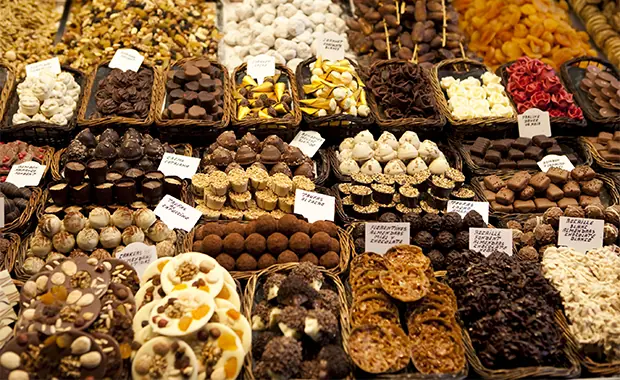
"Chocolate: I try to stay away from it," commented my client, a runner who described herself as having a rampant sweet tooth. For her, chocolate fits into the categories of junk food, guilty pleasure and ruiner of good intentions to lose weight. Yet, she also recognized there is potentially a happier side of the story. Ads for (dark) chocolate suggest chocolate is good for us. Chocolate comes from plants and contains the same health-protective compounds that are found in fruits and vegetables.
So what is the whole story on chocolate? Is it little more than an alluring form of refined sugar, saturated fat and empty calories? Or does chocolate (in moderation, of course) have positive qualities that might be beneficial for athletes?
Here are some nuggets of information about chocolate. I'll let you decide whether the health benefits of eating chocolate are greater than the health costs—and if you personally want to define chocolate as a "health food" within the context of your own sports diet.
The "Bad"
The bad news is chocolate consists of primarily saturated fat and sugar. A Hershey's Chocolate Bar (43 g) contains 210 calories, 24 grams sugar (46 percent of calories), 13 g total fat (55 percent of calories) and 8 g saturated fat, equivalent to a tablespoon of butter. Boo hoo. (But here's how you can rationalize including this popular treat in your overall well-balanced sports diet: The fat in chocolate does not raise bad cholesterol levels and the sugar (carb) in chocolate fuels your muscles...)
People tend to eat chocolate in bursts—a lot in a day, such as on holidays or pre-menstrually—or none. The question arises: Would enjoying some chocolate every day help reduce an athlete's urge to binge-eat the whole bag of, let's say, M&Ms in a moment of weakness? That's a good question and one that needs to be researched. We do know that deprivation and denial of food contributes to overeating. You know the syndrome: "I'm starting my diet Monday morning, so Sunday is my last chance to eat chocolate..." and there goes the whole bag of M&Ms.
I invite my clients to try taking the "power" away from chocolate by enjoying a little bit every day, such as for dessert after lunch. Ideally, daily chocolate could reduce it to being simply a commonplace plant food, just like bran cereal, an apple or carrot sticks. Give it a try?
The "Ugly"
Some athletes claim they are "addicted" to chocolate. Perhaps "chocolate addicts" grew up in a household where their parents banned chocolate? Now, as grown-ups, maybe they rebel by eating Reese's Pieces by the bagful? Or maybe they're "super tasters"—and the flavor of chocolate is just irresistible? Perhaps they have a genetic difference that makes chocolate highly attractive? Some day, genetic testing may help us find the answer to that question.
The "Good"
Chocolate is made from cocoa. Cocoa comes from a plant and is a rich source of health-protective phytochemicals, just like the kind you get from fruits, vegetables and whole grains. Two tablespoons natural cocoa power (the kind used in baking) offers the same antioxidant power as 3/4 cup blueberries or 1.5 glasses red wine.
Of all the types of chocolate, dark chocolate is the richest source of phytonutrients. Unfortunately, dark chocolate has a slightly bitter taste and most people prefer the sweeter milk chocolate. Maybe we should raise today's children on dark chocolate, so they will they learn to prefer it.
One phytochemical in cocoa is nitrate. Nitrate gets converted into nitric oxide, a chemical known to increase blood flow. Nitric oxide lowers blood pressure, a good thing for aging athletes who want to stay youthful and invest in their health. (1)
- 1
- of
- 2







Discuss This Article